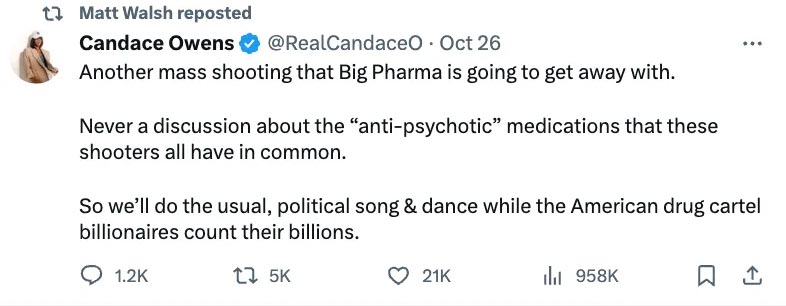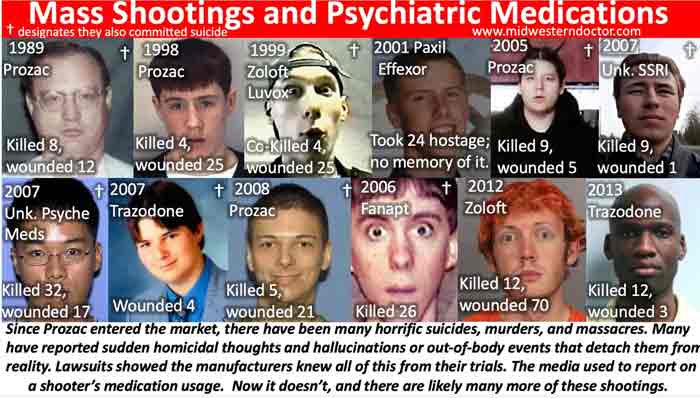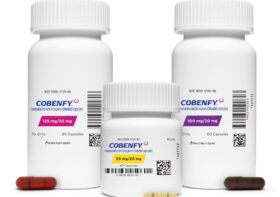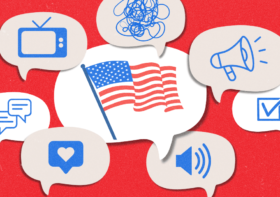Decades of Evidence That SSRI Antidepressants Can Cause Mass Shootings

Most holistic doctors consider Selective Serotonin Reuptake Inhibitors (SSRI) anti-depressants to be one of most harmful mass-prescribed drugs on the market (it typically makes their top 5). However unlike the other drugs, which are just unsafe and ineffective, SSRIs also have a fairly unique problem — they can kill people who are not even taking the drugs.
Note: Other common contenders for that list are Statins, NSAIDs (e.g., ibuprofen), and acid reflux medications (proton pump inhibitors like prilosec). The harms and irrationality of those drugs are discussed here, here and here.
Since SSRIs first entered the market, many have noticed the unusual correlation between their consumption and completely out of character violently psychotic behavior, such as extremely disturbing homicides or suicides being committed by the individual.
As the years have gone by, more and more evidence has accumulated (e.g., through lawsuits against the drug companies) that SSRIs cause psychotic violence, and in parallel, as the usage of these drugs has spiked, more and more grisly killings have occurred.
As you might imagine, there are many taboo areas in medicine (e.g., suggesting that vaccines can cause neurological damage to children). However, out of all of them, I’ve found by far the most hostility is directed towards anyone who insinuates mass shootings may be linked to SSRIs (e.g., I got in quite a bit of professional trouble for doing this in the past).
One of the first articles I wrote on Substack (on 5-27-22) was about this topic. It went viral and since then I’ve noticed there has gradually been more and more people who have been willing to speak out on it.
I attribute this to the current political climate (the Trump presidency and the vaccine mandates has made conservatives much more willing to question both big media and big Pharma) being one where this message wanted to be heard and other conservative commentators seeing a large audience for it existed.
Two months later (on 7-25-22), Tucker Carlson aired what I believe to be the first segment I’ve seen in the mainstream media discussing this taboo topic:
Note: I edited out the political commentary from this segment. The full version of it can be viewed here.
Since that time, other prominent conservatives have spoken out on this issue (e.g., Rep. Marjorie Taylor Greene). Conversely, the horror of the “far-right hysteria against SSRIs” has become a talking point of the left (e.g., see this Huffington Post piece and this Slate piece) — something I suspect is due to the high rates of psychiatric medication usage in the modern left and big Pharma buying out the Democratic party during Obama’s presidency.
Fortunately, those attacks did not work, and the violent risks of SSRI’s have gradually become more acceptable to talk about (e.g., RFK Jr. has mentioned them during his presidential campaign and not backed down when challenged on the point).
In turn, each time a mass shooting happens, the same script is repeated (we need to ban all guns and have more mental health care [i.e. psyche meds] for everyone). Fortunately, this script is losing its appeal and SSRIs are more and more frequently being mentioned each time a mass shooting happens.

Recently Matt Walsh also did a segment on this topic, which like Tucker’s segment was seen by millions of people.
Note: The full version of this episode can be viewed here.
Having watched this dynamic play out for decades, it’s hard for me to put into words how monumental of a change this newfound awareness of the dangers of SSRIs is.
The only comparable example I can think of are many people now being open to considering the dangers of childhood vaccination — something which has taken a century to bring into the public awareness (e.g., my friends who gave everything they had to speak out in the 1980s and 1990s on vaccine safety were almost completely alone and cannot believe just how much the public’s receptivity to this message has changed in the last few years).
Correlation or Causation?

One of the most common arguments used to dismiss the link between SSRIs and psychotic violence is that people who are mentally ill are more likely to be on psyche meds, so the “correlation” between psyche meds and psychotic violence is simply a product of pre-existing mental illness and would have happened independently of the psyche med.
However, while claiming “correlation is not causation” makes it possible to refute this link while sounding intelligent in the process, there are a few major problems with this argument.
First, there is a lot of evidence tying SSRI usage to these events, including clinical trial data that was hidden from the public. Since that evidence was not covered in Tucker or Walsh’s presentation, it will be the focus of this article.
Second, there is a black-box warning on the SSRIs for them increasing the risk of suicide, something which can only be possible if some degree of causation does in fact exist.
Third, these psychotic events are completely out of character for the individuals who commit them, and in many cases they report a very similar (and disconcerting) narrative of what they experienced prior to and during the shooting.
Note: Big Pharma, working hand in hand with the FDA fought tooth and nail for decades to prevent a warning from ever being added to the SSRIs. I believe this is in part due to how much money is made off of these drugs (presently their sales make approximately 40 billion dollars a year).
The SSRI Era
Selective serotonin reuptake inhibitors (SSRIs) have a similar primary mechanism of action to cocaine. SSRIs block the reuptake of Serotonin, SNRIs, also commonly prescribed block the reuptake of Serotonin and Norepinephrine (henceforth “SSRI refers to both SSRI and SNRI), and Cocaine blocks the reuptake of Serotonin, Norepinephrine, and Dopamine.
SSRIs (and SNRIs) were originally used as anti-depressants, then gradually had their use marketed into other areas and along the way have amassed a massive body count.
Once the first SSRI entered the market in 1988, Prozac quickly distinguished itself as a particularly dangerous medication and after nine years, the FDA had received 39,000 adverse event reports for Prozac, a number far greater than for any other drug.
This included hundreds of suicides, atrocious violent crimes, hostility and aggression, psychosis, confusion, distorted thinking, convulsions, amnesia, brain-zaps, a feeling that your brain longer works right, and sexual dysfunction (long-term or permanent sexual dysfunction is one of the most commonly reported side effects from anti-depressants, which is ironic given that the medication is supposed to make you less, not more depressed).
Note: I and many colleagues also believe the widespread adoption of psychotropic drugs has significantly distorted the cognition of the demographics of the country that frequently utilize them (which to some extent stratifies by political orientation), which in turn has created a wide range of detrimental shifts in our society.
SSRI homicides are common, and a website exists that has compiled thousands upon thousands of documented occurrences. As far as I know (there are most likely a few exceptions), in all cases where a mass school shooting has happened, and it was possible to know the medical history of the shooter, the shooter was taking a psychiatric medication that was known for causing these behavioral changes.
After each mass shooting, memes illustrating this topic typically circulate online (often citing many of the same individuals in the picture in the previous section).
However, as mentioned above, the idea that “SSRIs cause mass shootings” is treated with widespread ridicule and animosity in a manner not that different from how anyone who claimed the “COVID vaccines were NOT safe and effective” was treated in 2020.
For instance, the argument to debunk both was always “correlation is not causation” (e.g., the young healthy lady who had a fatal heart attack immediately after a vaccine might have had that happen anyways), and when data to support this contention is presented, it is always ignored by the other side.
Since there are many serious issues with psychiatric medications, to avoid being too long, this article will exclusively focus on their tendency to cause horrific violent crimes, something which was known long before they entered the market by both the drug companies and the FDA.
Note: A significant portion of this article came from the book Deadly Psychiatry and Organized Denial by Peter C. Gøtzsche (which builds upon the critical work Peter Breggin did to expose this issue). For those of you interested in learning more about this topic, I would strongly advise reading that book, as I can only scratch the surface of the issues with these medications within this brief article.
Lastly, for anyone who reads this article is presently taking an SSRI or SNRI, it is critically important to NOT suddenly stop taking them. These addictive drugs produce very strong (and longlasting) withdrawal symptoms that many of my readers have shared. More importantly, there are many cases of catastrophic events (e.g., a suicide or mass murder) that followed the abrupt discontinuation of an SSRI.
If this is something you choose to do, you need to gradually taper down the dosage (sometimes to the point you use sandpaper to slowly shrink a pill) with a professional who has experience in this area.
However, since doctors who help can you safely withdraw from an SSRI are difficult to find, we put together a guide on the (incredibly unfair) withdrawal process which can be viewed in the second half of this article.
Note: Many of the stories I will share in this article are similar to those I have received from numerous readers (e.g., see the comments on the first article, second article, third article, and fourth article along with numerous comments on Twitter) — which I believe highlights how common SSRI injuries are. Many of these stories are very difficult to read through, but I nonetheless believe need to be heard.
Akathisia
One of my relatives grew up in a big city during a particularly bad crime wave. One of his most notable memories from the time was looking up and seeing a man who was screaming “the ants are trying to get me” frantically tying bedsheets together (so he could flee down the fire escape) as armed men were rushing to his location yelling “get that ***** ******.”
My relative ran out of the area to avoid getting shot, but from the brief look he had at the fleeing man, was almost certain that man was high on cocaine, and experiencing coke (or crack) bugs, one form of Akathisia and a well-documented effect of those drugs.
Akathisia, an extreme form of restlessness is defined as a psycho-motor disorder where it is extremely difficult to stay still. What this definition omits to mention is that akathisia is incredibly unpleasant to the degree that many individuals who experience it frequently commit suicide or homicide (or both). One of the earliest reports from patients with drug-induced akathisia was:
“They reported increased feelings of strangeness, verbalized by statements such as ‘I don’t feel myself’ or ‘I’m afraid of some of the unusual impulses I have.’”
Akathisia is much more common than most people realize. To share a personal anecdote — I occasionally discuss this topic with medical students and a few have confided they previously experienced akathisia after using a psychiatric medication and it was so excruciating that one told me they seriously contemplated suicide at the time.
Akathisia (and psychosis) are known side effects of cocaine, methamphetamine, SSRIs, antipsychotics, and ADHD stimulant medications.
However, while the common triggers have been identified, the actual mechanism for akathisia is still poorly understood and theorized to result from alterations in the center of the brain involved in movement. These behavioral changes are so unusual and disturbing there are often simply described as the individual appearing to be possessed.
Note: Numerous patients I’ve talked to (with or without akathisia) who had bad reactions to SSRIs have shared that they felt as though some type of dark force was trying to take over their body.
From my own exploration of this topic, I have noticed that some individuals with cocaine intoxication (I have not yet examined a patient on the other drugs experiencing akathisia) have a characteristic (often porous) perturbation in their bio-electric field, which while very complex to describe, does resemble “frantic ants running all over the body,” and in theory could explain part of the akathisia experience.
As this idea is contained within a medical model most healthcare practitioners do not ascribe to, it has been difficult for me to evaluate the validity of this hypothesis. I have met a few other colleagues who made the identical observation, so this is a periodic topic of discussion amongst us as we believe there is significant value in developing a model that can explain this puzzling condition.
To further illustrate how perplexing the behaviors observed are on SSRIs consider this correspondence from a clinical investigator to Pfizer:

>>>>> Click Here <<<<<
More importantly, consider Pfizer’s response:

A week ago, I heard the most compelling illustrations of this phenomenon I’ve come across after a 20-year-old with every characteristic of a mass shooter, snuck into an amusement park in Northern Colorado during the night.
“The suspect had been heavily armed with a semi-automatic rifle and semi-automatic handgun and multiple, loaded magazines for both weapons,” it added. “He was wearing body armor and what appeared to be a ballistic helmet. Additionally, multiple improvised explosive devices (IEDs) were discovered with the suspect and in a vehicle associated with the suspect.
The sheriff’s office said that while an investigation into the incident was ongoing, “given the amount of weaponry, ammunition, and explosive devices found, the suspect could have implemented an attack of devastating proportions upon our community.”
However, rather than conduct the shooting, he committed before the park opened and left a remarkable message:
“In the bathroom where Barajas Medina was discovered, written on the wall were the messages “I am not a killer” and “I just want to get into the caves,” a police spokesperson confirmed to Newsweek.”
Note: Like many other mass shooters, these actions were completely out of character for Barajas. His brother (who he lived with) “was at a loss for what was going on in his brother’s mind,” “didn’t know of any connections his brother had to the park” and stated “I didn’t think he was a dangerous person.”
This narrative suggests that the psychosis Barajas was under partially wore off during the night, at which he recognized something evil was compelling him to do the shooting and he chose to end his life to prevent it. This is similar to a few other stories I’ve heard of SSRI violence.
For instance, Cory Baadsgaard developed increasing (and sometimes demonic) hallucinations after starting an SSRI, went to school with a loaded rifle and then partially realized what he was doing after he’d taken everyone hostage, surrendered, partially regained consciousness in the principle’s office, but had no memories of what had happened until he woke up in a cell at Juvenile Hall (where he spent 14 months).
Note: The next (three minute) video featured provides an even more powerful illustration of this phenomenon.
Akathisia Homicides
This section will list some of the evidence substantiating the link between psychiatric medications and horrific homicides. When you review this type of information, it is very easy to intellectually disassociate from what’s contained within it. For that reason, I would like to request you first watch this two-minute video of one father who has to live with knowing he killed his child he still loves from the bottom of his heart.
He was ultimately not criminally convicted, however, most individuals in these circumstances typically are.
Note: I need to emphasize that this individual’s story is not unique, he just has been unusually dedicated in bringing public awareness to what happened. It also illustrates how evil these drugs are, as like the individuals mentioned above, they become forced to do something that violates every core principle they stand for.
Much like the vaccine industry, the psychiatric industry will always try to absolve their dangerous medications of responsibility and will aggressively gaslight their victims. Despite these criticisms, there are three facts can be consistently found throughout the literature on akathisia homicides which Gøtzsche argues irrefutably implicate psychiatric medications as the cause of violent homicides:
• “These violent events occur in people of all ages, who by all objective and subjective measures were completely normal before the act and where no precipitating factors besides the psychiatric medication could be identified.
• The events were preceded by clear symptoms of akathisia.
• The violent offenders returned to their normal personality when they came off the antidepressant.”
Numerous cases where this has happened are summarized within this article from the Palm Beach Post. In most of those cases, a common trend of these spontaneous acts of violence emerges: the act of violence was immediately preceded by a significant change in the psychiatric medications used by the individual.
In one case, shortly before committing one of these murders, one of the perpetrators also journaled that, while taking Prozac, that he felt as if he was observing himself “from above.”
Individuals with a mutation in the gene that metabolizes psychiatric drugs are much more vulnerable to developing excessive levels of these drugs and triggering severe symptoms such as akathisia and psychosis.
There is a good case to be made that individuals with this gene are responsible for many of the horrific acts of iatrogenic (medically induced) violence that occur, however to my knowledge, this is never considered when psychiatric medications are prescribed.
Gøtzsche summarized a peer-reviewed forensic investigation of 10 cases where this happened (all but one of these involved an SSRI or an SNRI):
“Male, 18 years, Prozac, sister was comatose after a car crash, violent akathisia for 14 days, killed his father four days after he ran out of pills.
Male, 35 years, Paxil, distressed by “on and off” relationship with mother of his child, stabbed former partner 30+ times to death after 11 weeks of akathisia.
Male, 46 years, Paxil, anxiety about not making enough money to support the family, killed his son in a manic-shift akathisia and delirium after 42..


